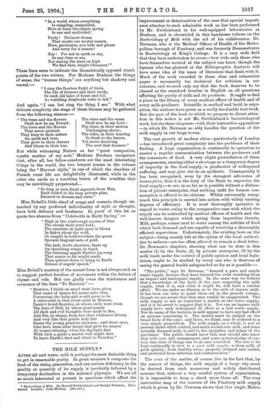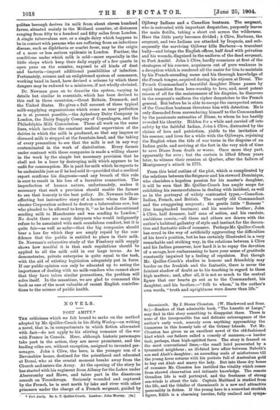• Bacteriology of Milk By Harold Swithinbank and aeorge Newman.
Blea- trated. London : John Murray. [25e. net.] Bacteriology of Milk with the aid of his collaborator, Dr. Newman, who is the Medical Officer of Health of the Metro- politan borough of Finsbury, and was formerly Demonstrator in Bacteriology at King's College. It is a very wide field that they have undertaken to cover,—how wide only those who have themselves worked at the subject can know, though the layman who has glanced at the Bibliographia Laetaria will
have some idea of the mass of literature that deals with it.
Much of the work recorded in these clear and exhaustive pages is necessarily too technical for criticism in our columns, and we need only say that the book deserves to be classed as the standard treatise in English on all questions affecting the purity of milk and its products. It ought to find a place in the library of every medical officer of health and of every milk-producer. Scientific in method and lucid in expo- sition, the authors have given us a really invaluable text-book. But the part of the book to which we propose to direct atten- tion in this notice is not Mr. Swithinbank's bacteriological work, but the three chapters—with their instructive appendices —in which Dr. Newman so ably handles the question of the milk supply in our large towns.
The vast growth of modern cities—particularly of London —has introduced great complexity into the problems of their feeding. A huge organisation is continually in operation to ensure a regular communication between the producers and the consumers of food. A very slight perturbation of these arrangements, causing either a shortage or a temporary degree of impurity in the food supply, is productive of widespread suffering, and may give rise to an epidemic. Consequently it
has been recognised, even by the strongest advocates of laissez-faire, that it is the duty of the State to supervise the food supply,—to see, in sq far as is possible without a disloca-
tion of private enterprise, that nothing unfit for human con- sumption is offered to its citizens. Whilst universally recog- nised, this principle is carried into action with widely varying degrees of efficiency. It is most thoroughly operative in regard to water, owing to the comparative ease with which the supply can be controlled by medical officers of health and the well-known dangers which spring from impurities therein.
Milk, perhaps, comes next to water among the articles of food which both demand and are capable of receiving a thoroughly efficient supervision. Unfortunately, the existing laws on the subject—being mainly left at the option of the local authori-
ties to enforce—are too often allowed to remain a dead letter. Dr. Newman's chapters, showing what can be done in this matter (1) by the State, (2) by private enterprise, (3) by the milk trade under the control of public opinion and local legis- lation, ought to be studied by every one who is desirous of seeing the general health safeguarded so far as is possible :— "The public," says Dr. Newman, "demand a pure and ample water supply, because they have learned the evils resulting from an impure and inadequate supply. In the same way we believe that a knowledge of the facts of the case respecting the milk supply, what it is, and what it might be, will have a similar effect. We are under no illusion as to the evils of impure milk. It has been our duty to point them out in the present volume, though we are aware that they may readily be exaggerated. The milk supply is not as important a matter as the water supply, and it is incorrect to suggest that it is. Nor can an impure milk supply have such widespread ill effect as a bad water supply. Nor do many of the bacteria in milk appear to have any bad effect on persons consuming it. The matter must be judged on the broad facts of the case ; and these, we think, may be reduced to a very simple proposition. The milk supply, as a whole, is not at present under strict control, and much second-rate milk, and some actually diseased milk, is sold to the prejudice and injury of the purchaser. The public should know this, and should also know that with care and management, and some systematising of con- trol, this state of things can be at once corrected. The aim to be kept continually in view is a pure milk supply—a clean milk, of good quality ; from healthy cows ; properly strained and cooled, and protected from infection and contamination."
The crux of the matter, of course, lies in the fact that, by the nature of things, the milk supply of a large city must be derived from such numerous and widely distributed sources that, without a very careful system of organisation, it is impossible to keep a check upon them all. The very
Instructive map of the sources of the Finsbury milk supply which is given by Dr. Newman shows that this single Metro.
politan borough derives its milk from about eleven hundred farms, situated mainly in the Midland counties, at distances ranging from fifty to a hundred and fifty miles from London. A single tuberculous cow, or a single dairy which happens to be in contact with persons who are suffering from an infectious disease, such as diphtheria or scarlet fever, may be the origin of a more or less serious epidemic in London. Further, the conditions under which milk is sold—more especially in the little shops which keep their daily supply of a few quarts in open pans on the counter, exposed to all kinds of dust and bacteria—import additional possibilities of infection. Fortunately, science and an enlightened system of commerce, working hand in hand, have devised a scheme by which these dangers may be reduced to a minimum, if not wholly obviated.
Dr. Newman goes on to describe the system, varying in details but similar in essentials, which has been devised to this end in three countries,—Great Britain, Denmark, and the United States. He gives a full account of three typical milk-supplying organisations which come as near perfection as is at present possible,—the Aylesbury Dairy Company in London, the Dairy Supply Company of Copenhagen, and the Philadelphia Milk Commission. These all work on the same lines, which involve the constant medical supervision of the dairies in which the milk is produced, so that any impure or diseased milk is stopped at the fountain-head, and the taking of every precaution to see that the milk is not in any way contaminated in the work of distribution. Every farmer under contract with these companies is made a willing sharer in the work by the simple but necessary provision that he shall not be a loser by destroying milk which appears to be unfit for consumption. He is paid for milk which he reports to be undesirable just as if he had sold it—provided that a medical report confirms his diagnosis—and any breach of this rule is sure to result in his loss of a lucrative connection. The imperfection of human nature, unfortunately, makes it necessary that such a provision should enable the farmer to see that honesty is the best policy. Dr. Newman tells an affecting but instructive story of a farmer whom the Man- chester Corporation ordered to destroy a tuberculous cow, but who pleaded to be allowed to keep it, "as he had discontinued sending milk to Manchester and was sending to London." No doubt there are many dairymen who would indignantly refuse to be associated with such scandalous conduct, but it is quite fair—as well as safer—that the big companies should bear a lose for which they are amply repaid by the con- fidence that the public is entitled to place in their milk. Dr. Newman's exhaustive study of the Finsbury milk supply shows how needful it is that such regulations should be applied to all the milk sold in our large towns. As he demonstrates, private enterprise is quite equal to the task, with the aid of existing legislation adequately put in force. If our public opinion can only be educated up to seeing the importance of dealing with no milk-vendors who cannot show that they have taken similar precautions, the problem will solve itself. In the meantime, we are glad to commend this book as one of the most valuable of recent English contribu- tions to the science of public health.
NO



























































 Previous page
Previous page